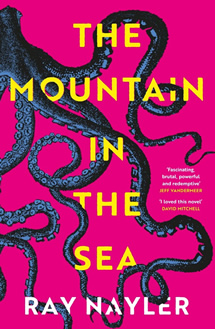Reviewed by Robert Goodman.
By Ray Nayler, Hachette, $32.99.
 While there are plenty of great space-battle and apocalypse and time-travel stories out there, some of the best science fiction deals in ideas. Ray Nayler’s thought-provoking debut The Mountain in the Sea is about a first contact, but a very terrestrial one, and, through a number of connected storylines, explores concepts of intelligence and what makes us human.
While there are plenty of great space-battle and apocalypse and time-travel stories out there, some of the best science fiction deals in ideas. Ray Nayler’s thought-provoking debut The Mountain in the Sea is about a first contact, but a very terrestrial one, and, through a number of connected storylines, explores concepts of intelligence and what makes us human.
The central plot of The Mountain in the Sea revolves around a first contact, as one of the main characters pithily puts it in one of the many epigraphs:
… this book asks the question: What if? What if a species of octopus emerged that attained longevity, intergenerational exchange, sociality? What if, unknown to us, a species already has? Then what?
Dr Ha Nguyen, How Oceans Think
Doctor Ha Nguyen has been brought to the Con Dao archipelago, a series of islands off the coast of Vietnam that have been evacuated and taken over by a multinational corporation, DANIAMA. DANIAMA want her to investigate a series of strange deaths that it believes may have been caused by an evolved group of octopuses. She is joined by Evrim, the world’s first and only artificially intelligent android, who was created by DANIAMA’s founder and essentially exiled when public opinion turned against the whole concept of intelligent androids. At the same time, an artificial intelligence expert called Rustem is hired by a mystery woman to do some high level hacking and a young Japanese man called Eiko finds himself shanghaied and enslaved on a factory fishing vessel also under the control an artificial intelligence.
The main plot revolves around Ha and Evrim and their attempts to make contact with what seems to be an intelligent species of octopus. Ha has been studying octopuses for years and firmly believes that they have the capacity to develop intelligence in the right circumstances:
This was an extraordinary creature even before it achieved language or tool-making. A master of survival and adaptation in the sea, living constantly in a state of threat – a state that demands fluid, continuous response. This is a shape-shifting hunter-gatherer. A master of its environment. Of camouflage and distraction.
Nayler’s thesis, expressed through Ha and the many quotes from her book, is that language emerges from environment and experience and that communication between two species from such different worlds can only ever be rudimentary. Yet the pair do find a way to communicate with the creatures in symbols and shapes, a breakthrough that Nayler describes poetically:
Ha was weeping. Ancient, this shape song. In it, rhythm of tide, of moon-ripple played out on night water. Of buoy-clang near the beach and shore of man. Of crab-scuttle and claw-clack. Of fish-dart and propeller-chug. Of whale-song in the wave.
The development of octopus intelligence is juxtaposed with the variousdifferent forms of artificial intelligence that appear in the book, from Buddhist robots that protect turtles, to holographic companions, to the brain that controls the fishing trawler and has a single operating goal, through to Evrim himself and the implications of artificial intelligence for humanity:
Evrim’s existence implicated yours. It implied you, too, were nothing more than a machine – a swarm of preprogrammed impulses iterating endlessly. If Evrim was a conscious thing, and made, then maybe you were made as well.
Later in the book, Ha comes to the conclusion that just being a human is not necessarily essential:
Consciousness is awareness I would say. Don’t doubt yourself – but the fact that you have a self that can doubt it is a self proves the existence of that self. So go ahead and doubt yourself …
What determines you are human is that you fully participate in human interaction and the human symbolic world … What more is there? Being human means perceiving the world in a human way. That’s all. So you are human.
All of this sounds heavy but the narrative, while dark at times, is anything but. Nayler works his philosophical musings well into a story that involves, among other things, drone warfare, a mutiny and industrial espionage. There is plenty to think about, and a fair amount of exposition through the many epigraphs from both Ha and Dr Arnkatia Minervudóttir-Chan, Evirm’s creator. But these serve to enhance the concerns of the novel rather than slow it down.
Ray Nayler brings his experience as advisor to the US National Oceanic and Atmospheric Administration, his scientific mind and his storytelling skill honed through short story writing to this debut. The Mountain in the Sea is a novel that will make readers think as they are rapidly turning the pages, and has some surprises built in when the various plot threads finally weave together.
Nayler says in his Acknowledgements that he wanted to tell a story of communication with an alien species, encompassing all of the complexity that comes with it, but set here on earth. He definitely succeeds in that and in sharing his fascination with octopuses. And he does so in an engaging narrative that achieves much more thematically, making this one of the best science fiction novels of 2022.
This review first appeared in Newtown Review of Books.
Over 850 more reviews can be found on Pile by the Bed.











